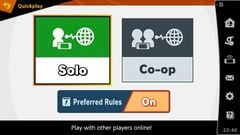Quickplay
Quickplay is a an online mode in Super Smash Bros. Ultimate that allows people to fight other people through the internet. It is the successor to Smash 4's online mode.
Quickplay has two game modes: Co-op and Solo. Co-op allows two players on the same console to play online doubles against other players on the same console. Solo allows players to play in 1v1 matches against other players with similar GSP (Global Smash Power) and region. When one of the player's characters reach a certain GSP Global Smash Power, Solo mode becomes Elite Smash, but only for that character. If all the characters lost the Global Smash Power to qualify for Elite Smash, the mode returns to normal Quickplay. The higher every one of a someone's character's Global Smash Power, the higher the player's roster GSP will be, which increases the amount of Global Smash Power a character you haven't played yet will start out with. This system makes it easier for people who already have characters in Elite Smash to get more in. If the network connection is unstable, a message will pop up and not allow quickplays. If a player disconnects during a match, their GSP will be lowered and recieve a warning. Soon they will get a temporary ban from Online Tournaments, Battle Arenas, and Quickplay. If you keep disconnecting, the ban will get longer every time. Contrary to popular belief, players do lose GSP if they disconnect at the end of a match. They will recieve the previousley mentioned punishments, but their opponent will not gain GSP.
Unlike its predecessor, Solo mode does not include For Fun or For Glory. Instead, players can set a preferred ruleset before selecting a mode. This ruleset allows users to have a higher chance of fighting opponents who have a similar ruleset, although it's not guaranteed. Preferred rules include the format, time limit, stage, stock count, whether Final Smash Meter is on or off, and which items should be turned on. When preferred rules are turned off, it allows any other players to decide how a match is played. When the game first released, there were many complaints from players because they were not entering matches the preferred ruleset they wanted, however this was later addressed.

